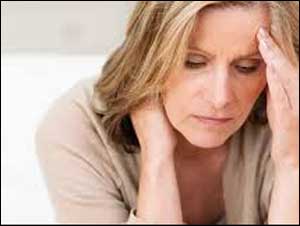- Home
- Editorial
- News
- Practice Guidelines
- Anesthesiology Guidelines
- Cancer Guidelines
- Cardiac Sciences Guidelines
- Critical Care Guidelines
- Dentistry Guidelines
- Dermatology Guidelines
- Diabetes and Endo Guidelines
- Diagnostics Guidelines
- ENT Guidelines
- Featured Practice Guidelines
- Gastroenterology Guidelines
- Geriatrics Guidelines
- Medicine Guidelines
- Nephrology Guidelines
- Neurosciences Guidelines
- Obs and Gynae Guidelines
- Ophthalmology Guidelines
- Orthopaedics Guidelines
- Paediatrics Guidelines
- Psychiatry Guidelines
- Pulmonology Guidelines
- Radiology Guidelines
- Surgery Guidelines
- Urology Guidelines
Social stress linked to Osteoporosis in post menopausal women

Older women who are under a lot of social strain may be more likely to develop brittle, fracture-prone bones after menopause than their counterparts with worry-free lives. The study has been published in the Journal of Epidemiology & Community Health.
Researchers followed 11,020 postmenopausal women over six years, giving them periodic bone mineral density (BMD) tests and mood assessments. Participants rated their level of social strain, or negative interactions or relationships; their social support, or positive relationships; and social functioning, or limitations in social activity.
Each one-point increase in social strain scores was associated with 0.082% greater loss of bone mineral density in the neck, 0.108% greater loss of BMD at the hip, and 0.069% greater loss of bone mineral density in the lower spine, the study found.
"Fractures are a major societal burden affecting 1 in 2 older women, due to a variety of risk factors that lead to bone loss," said Shawna Follis, lead author of the study and a researcher at the University of Arizona in Tucson.
"We found that high social stress is one risk factor that increases bone loss in ageing women," Follis said by email.
Reduced estrogen production during menopause and afterwards can slow the production of new bone tissues in women. Over time, this process leads to decreased BMD and increases the risk of osteoporosis.
Bones thinned by osteoporosis are brittle and more easily fractured.
Much of the previous research into connections between osteoporosis and mental health has focused on whether impairment due to bone thinning or fractures might contribute to mood disorders like depression or anxiety, the researchers note.
In the current study high levels of social stress were associated with lower BMD even after researchers accounted for other factors that can impact bone health like age, education, chronic health problems, weight, smoking status, alcohol use, hormone therapy, age at menopause, physical activity, and fracture history.
Lower social functioning was tied to greater decreases in bone mineral density in the neck and hip, the current study found. And low social support was associated with greater decreases in the neck.
The study doesn't prove that social stressors directly impact bone mineral density, and researchers also didn't look at the connection between various social stressors and falls or fractures. And it's impossible to say from the study whether easing of social stress would have any effect on bone health.
Still, the results suggest that older women who do a better job of managing stress may have healthier bones and lower fracture risk, said Dr. JoAnn Pinkerton, director of midlife health at the University of Virginia Health System in Charlottesville, Virginia and executive director emeritus of the North American Menopause Society.
"For women who are anxious or have higher social stress levels, mindfulness, cognitive therapy, self-calming strategies, yoga, counseling, access to community building, or, if needed, medications might decrease the psychosocial stress levels," Pinkerton, who wasn't involved in the study, said by email.
When women do have osteoporosis, there are still things they can do to prevent bones from becoming more brittle, Pinkerton added.
"Calcium, vitamin D and strength training may prevent further bone loss," Pinkerton said. "Although many women are fearful of the side effects associated with medications for treating osteoporosis, the side effects are actually rare while fractures may be life-changing."
Osteoporosis medicines such as Fosamax (alendronate sodium), Actonel (risedronate sodium), and Boniva (ibandronate sodium) work by slowing down how fast the body removes old bone, allowing time to regrow bone and make fractures less likely.
These medicines can cause nausea and abdominal pain, as well as rare but more serious side effects like cracks in the thighbone or damage to the jawbone. Alternative treatments include estrogen or two injected medicines, denosumab and teriparatide.

Disclaimer: This site is primarily intended for healthcare professionals. Any content/information on this website does not replace the advice of medical and/or health professionals and should not be construed as medical/diagnostic advice/endorsement or prescription. Use of this site is subject to our terms of use, privacy policy, advertisement policy. © 2020 Minerva Medical Treatment Pvt Ltd